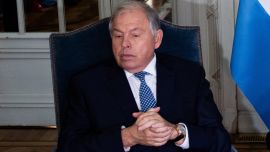The Argentine peso snapped a five-day losing streak as Wall Street banks were active in the local currency market amid attempts by the United States government to help its ally Javier Milei ahead of a crucial vote this weekend.
Both JPMorgan Chase & Co and Citigroup Inc were active in Argentina’s spot market Wednesday, according to people familiar with the matter. The peso, which had declined for five straight sessions, closed 0.1 percent stronger at 1,489 per US dollar – two pesos from the weakest limit of its trading band.
Traders estimate the US Treasury sold between US$400 million and US$500 million, which they say is its biggest intervention so far. No official figures have been released. JP Morgan and Citi declined to comment, while the US Treasury didn’t immediately reply to emailed requests.
Milei andUS Treasury Secretary Scott Bessent are trying to stave off a run on the currency with just days to go before Sunday’s congressional midterm election, which could determine the fate of the libertarian leader’s market-friendly reforms. The peso came within cents of breaching its trading band Tuesday as Argentines sought shelter in hard currency ahead of the vote. That prompted the Central Bank to step in to prop it up for the first time in about a month, while the US Treasury also intervened.
The market will remain under pressure because the supply of dollar from the commercial side is limited as sellers “wait for the result of the election to see what happens, if this was all just noise and it ends, fading away, or what,” said Juan Manuel Truffa, an economist at local consultancy Outlier.
Argentina’s dollar bonds were down across the curve, with notes due in 2035 falling almost a cent to trade at 55 cents on the dollar, according to indicative pricing data compiled by Bloomberg.
“It continues to feel like every time a small burst of buying from offshore funds comes in, the bonds get slapped down from supply coming from resident holders who are freaked out about the potential Black Swan on Sunday night,” Walter Stoeppelwerth, chief investment officer at local brokerage Grit Capital Group, wrote in a report.
Milei’s party is hoping to come out of the October 26 with increased support in Congress, and he notched small win Wednesday afternoon when fresh data showed the economy expanded slightly in August despite a liquidity crunch. But a landslide defeat in a provincial vote last month rattled markets and stoked fears the interventionist Peronist opposition could return to power in the 2027 presidential election.
It was after that vote that Donald Trump’s administration stepped in. Bessent confirmed the signing of a US$20-billion swap line with Argentina on Tuesday, calling it “a bridge to a better economic future for Argentina, not a bailout.” His efforts to line up the same amount of private-sector funding for the crisis-prone nation, however, remain unfulfilled as banks seek clarity on terms, structure and collateral.
Draining the $20 billion swap line to defend Argentina’s currency “could quickly tip the scales unfavorably,” Juan Manuel Pazos, an economist at local broker One618, wrote in a report this week. “If the intention is to uphold the FX regime for some time, then the second $20 billion bailout from banks would probably be necessary.”
Milei’s economy chief, Luis Caputo, reiterated in a post on X Wednesday that there would be no changes to foreign-exchange policy. The peso’s trading bands, established in April as part of Argentina’s agreement with the International Monetary Fund, are increasingly viewed by investors as supporting an overvalued currency.
Traders are watching potential moves in Milei’s Cabinet. Argentine Foreign Minister Gerardo Werthein, who has been a key participant in talks with the US, offered his resignation on Tuesday evening.
Political tension is also intensifying in the United States. In response to Democratic Senator Elizabeth Warren’s criticism of US spending during the government shutdown, Bessent described the Trump administration’s effort to prop up Argentina as “mission critical.” The use of Treasury resources “provides targeted backing to a key ally that has pursued fiscally responsible policies and economic freedom,” he said in a letter to Warren dated Tuesday.
Argentine markets, meanwhile, are showing signs of exhaustion from the barrage of social media messages posted by both US and Argentine authorities, according to Joaquin Bagues, managing director at local broker Grit Capital Group. “Right now is pay per view,” he said. “The market will buy in when it has more certainty.”
by Nicolle Yapur, Ignacio Olivera Doll & Hannah Levitt, Bloomberg





















Comments